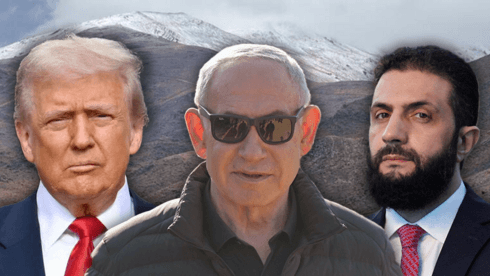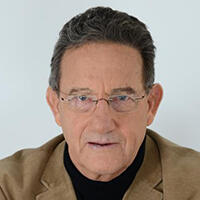The Prime Minister's visit to the Syrian border, accompanied by the exceptional and senior delegation, was a political-security act aimed at sending a signal to Sharia and Trump: Israel will not give up its interests. According to the reactions, the message was conveyed. The Syrian interest in negotiations with Israel and the historic visit to the White House - and Trump's perfume that aroused serious concern in Jerusalem
Ron Ben Yishai
|
The security patrol
held yesterday (Wednesday) by the Prime Minister
Benjamin Netanyahu
The Golan Heights buffer zone was a planned political-security act. It was intended to convey a vital Israeli message, first and foremost to the new regime in Syria, and at the same time to the US President.
Donald Trump
And to the President of Turkey
Recep Tayyip Erdogan
How important the message was is demonstrated by the fact that the judges in Netanyahu's trial agreed at the beginning of the week.
Cancel an entire day of discussions
To allow him a well-publicized foray into the Syrian Golan Heights.
The unusual composition of the entourage that accompanied Netanyahu, which included not only the Minister of Defense
Israel Katz
, the Chief of Staff
Eyal Zamir
And the head of the Shin Bet
David Zini
- But also the Minister of Foreign Affairs
Gideon Saar
, was intended to emphasize the political nature of the message embodied in the very existence of the visit, in addition to the security aspect of visits of this type by the head of the political echelon to the military contact lines.
What the prime minister, in his helmet, protective vest, and binoculars, wanted to make clear to all his correspondents in the international arena was that the IDF would remain in its current deployment of nine outposts in the buffer zone in the Syrian Golan and, of course, on the shoulder of Mount Hermon, which overlooks - and provides intelligence on - the Damascus Basin.
This preparation, Netanyahu clarifies during his visit, will continue until Damascus meets the security requirements of the State of Israel: a demilitarized zone from Damascus south to the Jordanian border, and east of it about 30 km in the Horn to the east of the Daraa-Damascus road. In this area, Israel demands, there will be no heavy weapons and no massive armed presence (beyond that necessary to enforce law and public order) of regime elements, nor of jihadist militias of the"people of the region" or of Syrian and Iraqi Shiites operating under the auspices and at the expense of Iran.
Israel also demands a permanent presence at Mount Hermon, where
The IDF took control of the Syrian outposts last December.
, after
The fall of President Bashar al-Assad
Israel's third main demand from the new regime in Syria is to agree to open a land corridor from the Israeli Golan Heights to the Druze communities around the city of Sweida and the district, which will be used to transfer aid from Israel to the Syrian Druze, and a commitment by the regime not to"harass" them and to protect them when necessary, despite political differences with their leadership.
The Syrian interest
The negotiations
These conditions have been pursued in recent months, but without results. Initially, it was led by the then head of the National Security Council
Tzachi Hanegbi
And after he was removed from his position by the Prime Minister, the Minister of Strategic Affairs continued the negotiations.
Ron Dermer
The Syrian partner was the Foreign Minister.
Hassan al-Shaibani
.
3 Viewing the gallery
(Photo: IDF Spokesperson, Khalil Ashawi/Reuters, Kobi Gideon/GMO, AP Photo/Alex Brandon)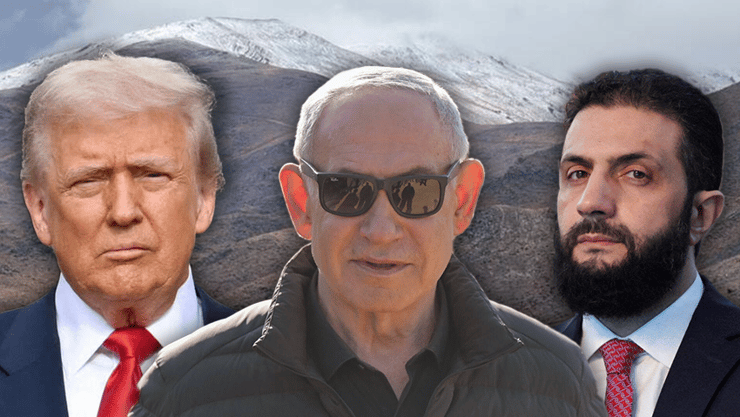
The Syrian interest in these negotiations was twofold: one, to get rid of the IDF presence in the buffer zone between the border with Israel in the Golan (the purple line), and the Syrian army formations in the Syrian Golan. This buffer zone, defined in the 1974 armistice agreements, is sovereign Syrian territory for all intents and purposes - but Israel seized enclaves within it and established outposts there, in order to prevent an onslaught by armed Syrian and Iraqi militias towards the Golan Heights settlements, in the terms of October 7, 2023.
Al-Sharia and his regime had - and still have - an important interest in reaching a security agreement with Israel. This is mainly to please President Trump and allow him to claim that Al-Sharia is no longer the same jihadist, the leader of Al-Qaeda in Syria, for whom the US offered a $10 million bounty. Therefore, from his perspective, he can be seen as a legitimate ruler of Syria and the economic sanctions that prevent reconstruction and development in the divided and devastated country can be lifted.
The one who brokered the deal between al-Sharaa and Trump and turned the Syrian jihadist, leader of Hayat Tahrir al-Sham, into a White House favorite was none other than the Saudi Crown Prince.
Mohammed bin Salman
This urged Trump to embrace Syria's new leader and allow him to advance his goals, which align with Saudi Arabia's religious and economic goals and objectives.
As mentioned, the negotiations between Israeli representatives and al-Shara'a representatives were not fruitful, mainly because the Syrian ruler demanded, with tacit American backing, that Israel dismantle the outposts it had built in the buffer zone and stop attacking from the air and destroying weapons caches in Syria from the ground. Al-Shara'a also rejected the Israeli demand to establish a land corridor for the Syrian Druze in the al-Sweida district, as Netanyahu had vehemently demanded (perhaps also out of an electoral calculation - a desire to please the Druze in Israel ahead of the upcoming elections).
Close relatives. Al-Sharaa and Trump in the White House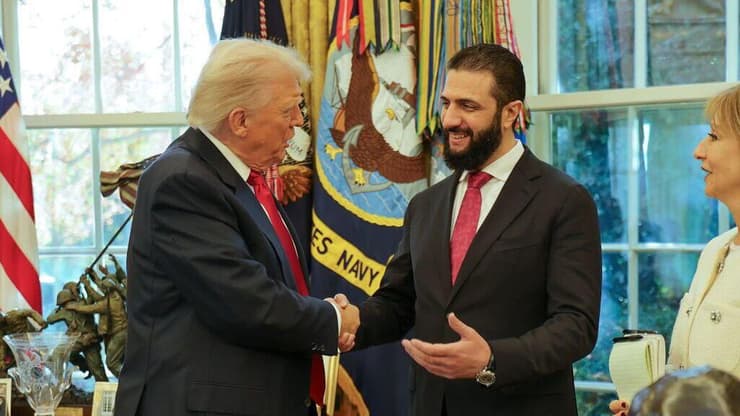
Trump did want Syria to join the Abraham Accords, but al-Shara made it clear in advance that this was
out of the question
Until Israel withdraws completely from the Golan Heights. Trump did not insist, and his representative agreed to settle for the security arrangement that al-Sharaa proposed. The failure of the talks on this arrangement frustrated all parties, and gradually led the new ruler of Syria to make belligerent statements against Israel's presence in the buffer zone, and against its demands to arm and provide military infrastructure to southwestern Syria.
The splash that set off warning lights
However, the direct cause of the Prime Minister's highly publicized trip to the buffer zone was apparently the signs of love and closeness that President Trump showered on the Syrian ruler when he
Visited the White House last week
According to information received by Ynet, warning lights flashed brightly in the Kirya and the Prime Minister's Office in Jerusalem, when Trump sprayed perfume (a private brand of the president of the world power, of course) on the new and"handsome" ruler of Syria and his foreign minister. The fear in Israel was that the gesture of closeness between Trump and the"repentant" jihadist would develop into open support for al-Shara's demands - including from Israel.
The Syrian President's historic visit to the US - and the basketball game with the senior officer | Watch
As a result, there is a need to convey to all interlocutors in the Syrian arena that Israel intends to stand up for its security interests. On the other hand, it is no secret that Netanyahu is now avoiding at almost all costs angering President Trump - a fickle man who has taken over the management of affairs in Gaza, Lebanon and vis-à-vis Iran. Even changes in the American president's mood, or accidental disagreements with Netanyahu, could lead to strategic damage in one or more of the three main arenas that Israel has handed over to the US. Therefore, a defiant declaration by Netanyahu, that he will not give up his security demands regarding Syria, is out of the question.
The alternative to such a statement was an indirect message embodied in a visit and a demonstrated presence in the buffer zone and on Mount Hermon by top-level Israeli security and political officials. The message was aimed at Ahmed al-Sharaa and President Trump, to make it clear to them that Israel sees its current preparations in the Golan as the minimum necessary to maintain its settlement on the Golan Heights, until Syria agrees to the demilitarization of the Syrian Golan and the Israeli presence on Mount Hermon.
It is very possible that the signal was intended to make it clear to Turkey and Russia, which is now trying to regain a foothold in Syria, that Israel has security interests in Syria and must take them into account. It is possible that the visit was also intended to prove to the Druze in Israel who stands by them and their brothers in Syria.
To ensure that the message would not be missed, the IDF held a dialogue meeting between the Prime Minister and reservists at one of the posts in the buffer zone, in which Netanyahu stated in great detail exactly what his intentions were and what Israel would do with regard to defensive preparations on the Syrian border.
The Syrian Rage, and the Confrontation at the UN
Netanyahu's signal, it turns out, was received. The one who immediately understood the hint was al-Shara, and the Syrian foreign broadcaster published an angry statement after the visit in which it called it"illegal." "This is a dangerous violation of Syria's sovereignty and territorial integrity, and a new attempt to impose reality," it said."Syria demands Israel's withdrawal from Syrian lands."
Syria was furious, the UN Secretary-General and France condemned. How will Trump respond? Netanyahu and his senior officials in the Golan Heights (Photo: Kobi Gideon, GPO)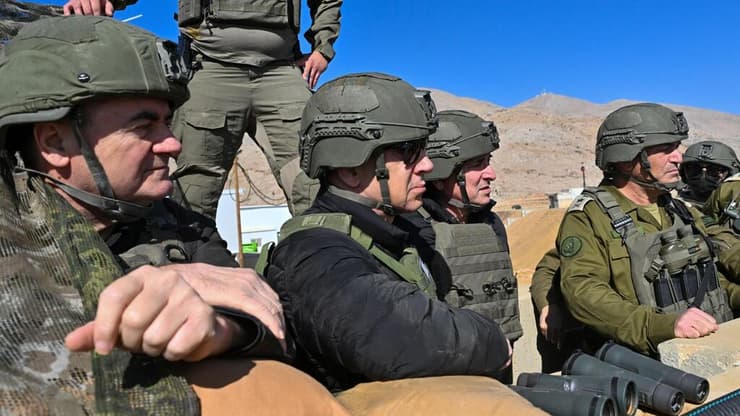
In addition, at Syria's request, the UN Security Council convened to discuss the issue, which included an exchange of words between Israeli Ambassador Danny Danon and Syrian Ambassador Ibrahim al-Albi."There is no proof that Syria has turned a new page, and one cannot talk about a 'new Syria' when Druze, Christians, and Alawites are being massacred," said Danon, who added:"Change is proven by actions: stopping the killings, restraining the militias, and protecting minorities." Al-Albi responded: "We have already proven ourselves to the Syrians, the region, and our allies. Is Israel doing the same?" Danon replied: "If you want us to believe in your change, see it."
UN Secretary-General Antonio Guterres condemned the visit: "This very public visit is worrying, to say the least. We call on Israel to respect the 1974 ceasefire agreement with Syria." In addition, the French Foreign Ministry even called for the IDF to withdraw from the Syrian Golan Heights, stating that"Israel must respect Syrian territory." The statement also stated that Paris is "mobilizing," alongside Washington, to calm tensions in the region. The only one who has not yet responded to the issue is the US itself.
Now it remains to be seen whether the correspondents understood the significance of this act of public military diplomacy by the Israeli prime minister - and to keep our fingers crossed that Trump and bin Salman don't get upset.

